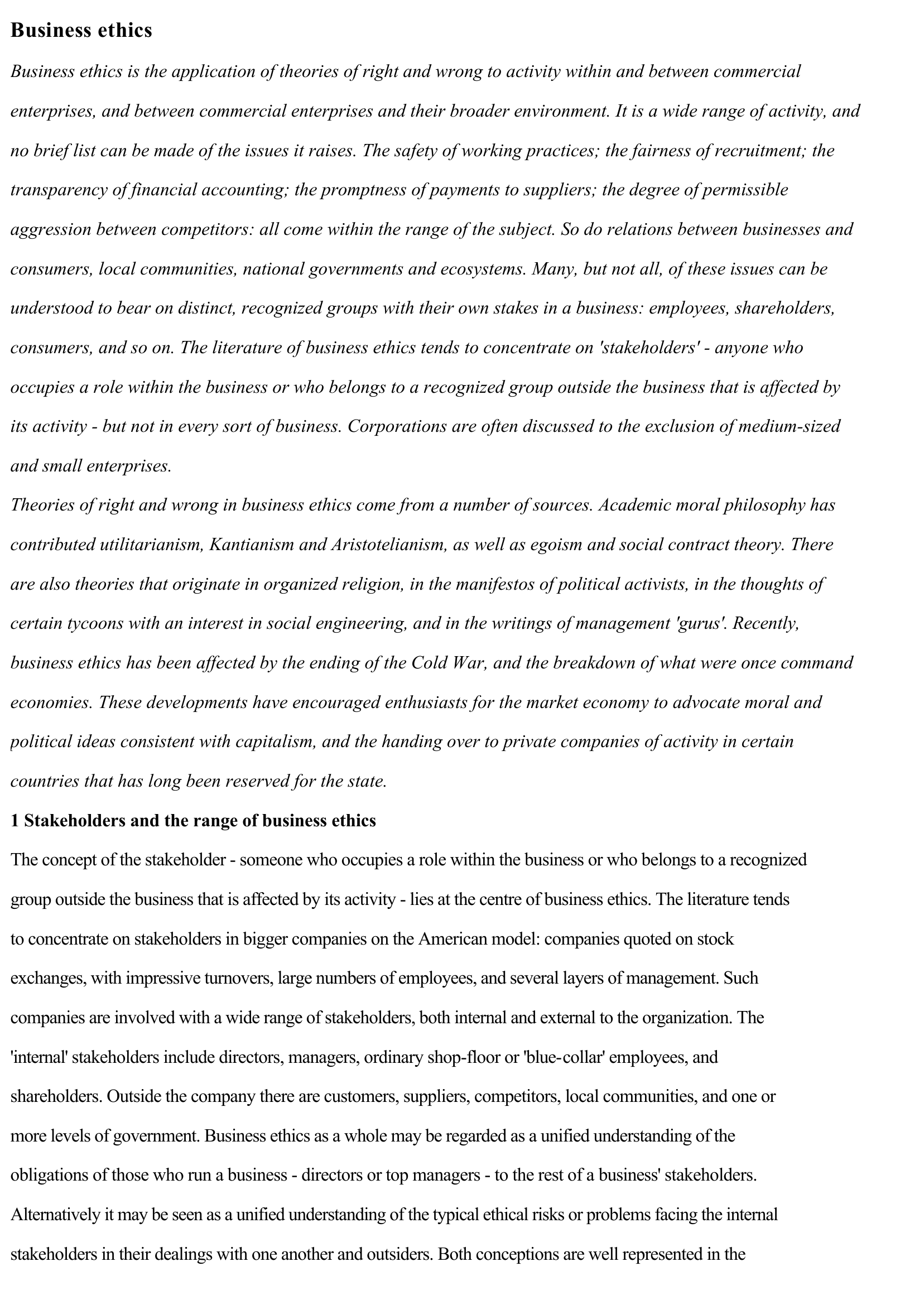Business ethics
Publié le 16/05/2020

Extrait du document
«
Business ethics
Business ethics is the application of theories of right and wrong to activity within and between commercial
enterprises, and between commercial enterprises and their broader environment.
It is a wide range of activity, and
no brief list can be made of the issues it raises.
The safety of working practices; the fairness of recruitment; the
transparency of financial accounting; the promptness of payments to suppliers; the degree of permissible
aggression between competitors: all come within the range of the subject.
So do relations between businesses and
consumers, local communities, national governments and ecosystems.
Many, but not all, of these issues can be
understood to bear on distinct, recognized groups with their own stakes in a business: employees, shareholders,
consumers, and so on.
The literature of business ethics tends to concentrate on 'stakeholders' - anyone who
occupies a role within the business or who belongs to a recognized group outside the business that is affected by
its activity - but not in every sort of business.
Corporations are often discussed to the exclusion of medium-sized
and small enterprises.
Theories of right and wrong in business ethics come from a number of sources.
Academic moral philosophy has
contributed utilitarianism, Kantianism and Aristotelianism, as well as egoism and social contract theory.
There
are also theories that originate in organized religion, in the manifestos of political activists, in the thoughts of
certain tycoons with an interest in social engineering, and in the writings of management 'gurus' .
Recently,
business ethics has been affected by the ending of the Cold War, and the breakdown of what were once command
economies.
These developments have encouraged enthusiasts for the market economy to advocate moral and
political ideas consistent with capitalism, and the handing over to private companies of activity in certain
countries that has long been reserved for the state.
1 Stakeholders and the range of business ethics
The concept of the stakeholder - someone who occupies a role within the business or who belongs to a recognized
group outside the business that is affected by its activity - lies at the centre of business ethics.
The literature tends
to concentrate on stakeholders in bigger companies on the American model: companies quoted on stock
exchanges, with impressive turnovers, large numbers of employees, and several layers of management.
Such
companies are involved with a wide range of stakeholders, both internal and external to the organization.
The
'internal' stakeholders include directors, managers, ordinary shop-floor or 'blue -collar' employees, and
shareholders.
Outside the company there are customers, suppliers, competitors, local communities, and one or
more levels of government.
Business ethics as a whole may be regarded as a unified understanding of the
obligations of those who run a business - directors or top managers - to the rest of a business' stakeholders.
Alternatively it may be seen as a unified understanding of the typical ethical risks or problems facing the internal
stakeholders in their dealings with one another and outsiders.
Both conceptions are well represented in the.
»
↓↓↓ APERÇU DU DOCUMENT ↓↓↓
Liens utiles
- Business Plan : FlyEats (Entreprise de livraison par drone)
- Medical Ethics.
- Business.
- LE CLIMAT DES AFFAIRES: DOING BUSINESS
- Analytic ethics


